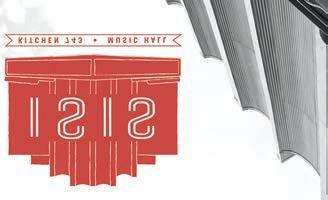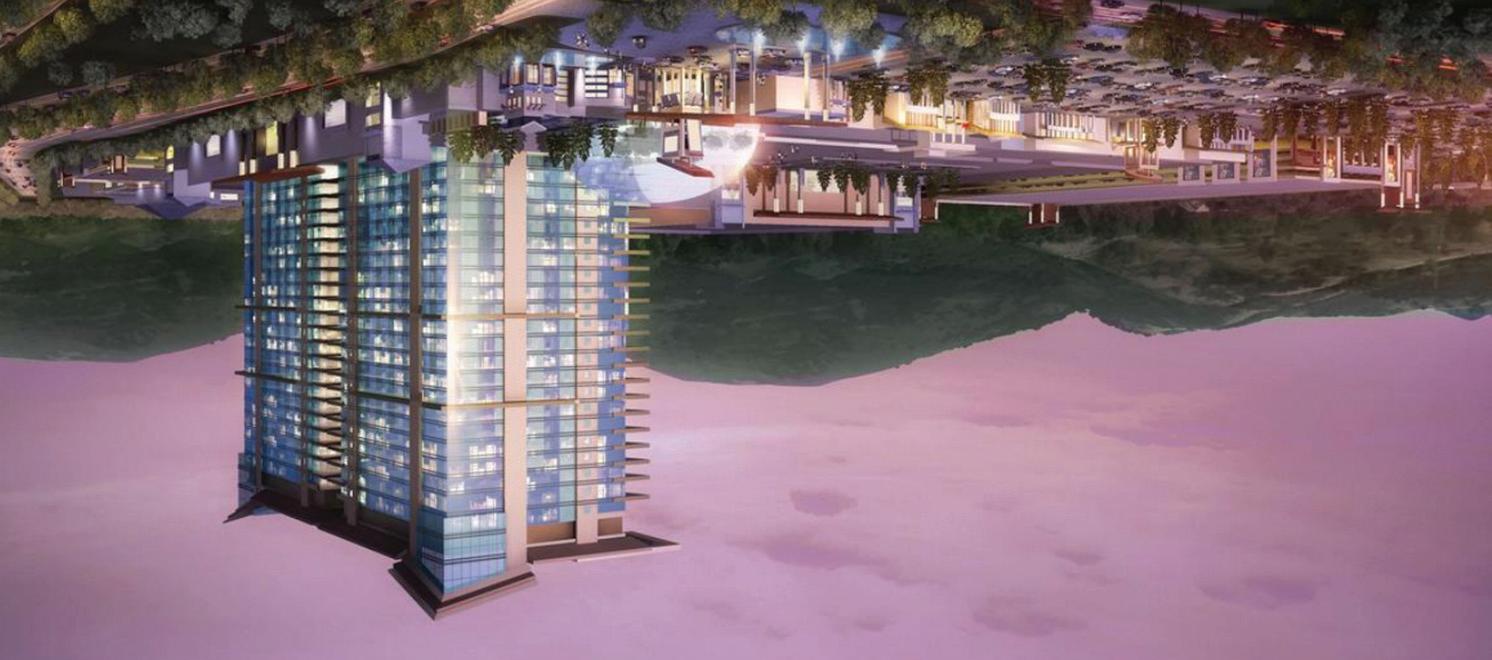
16 minute read
Feds clear the way for Catawba casino
CASUAL FINE DINING WITH LIVE MUSIC COVERED PATIO LATE NIGHT MENU

KITCHEN 743 TUESDAY THRU SUNDAY FROM 5PM UNTIL... SUNDAY BRUNCH 10AM TO 2PM AVAILABLE FOR PRIVATE EVENTS
743 HAYWOOD RD • WEST ASHEVILLE ISISASHEVILLE.COM 828.575.2737


Do You Know if Your Website is Mobile Friendly?






70% Of People Use Their Phones To Search - Can They Find Your Site? Ask How MSM Can Help!
Feds clear the way for Catawba casino
EBCI will sue over decision
BY HOLLY KAYS S TAFF WRITER T he Eastern Band of Cherokee Indians plans to sue the federal government in protest over a March 12 decision that will allow the Catawba Indian Nation to move forward with plans to build a casino in Kings Mountain. The Cherokee are claiming that the decision is flawed and that the government violated the law by not consulting the EBCI during completion of the associated Environmental Assessment. “The federal government has no right or authority to create a new reservation for the Catawba Nation across state lines, into Cherokee historical territory, just to build a casino,” said EBCI Principal Chief Richard Sneed. “This decision creates a dangerous precedent for all federally recognized tribes that empowers corrupt developers and their lobbyists to use politicians to determine what laws and precedents are followed and which ones are ignored. This decision cannot and will not stand.”
The Catawba are a federally recognized Indian tribe with a reservation in Rock Hill, South Carolina, which is 34 miles southeast of the 16.57-acre property where the casino is to be built. It is unusual, even unheard of, for a tribe to receive permission to build a casino across state lines from its main reservation. However, said Catawba Chief Bill Harris, his tribe’s case is unusual as well. The Cherokee response is unwarranted.
“It is unfortunate that the EBCI continues to perpetuate this narrative of tribe versus tribe,” he said. “The Catawba Nation has reached out many times to the leadership of EBCI to try to work together. In the past Chief Sneed has asserted that he isn’t against federally recognized tribes going into the gaming industry, but he wants all tribes to follow the DOI established regulations. In Catawba’s decision letter from the Department of Interior, it clearly outlines that Catawba followed the process from beginning to end, and the decision also demonstrates our cultural and historical ties to this area. Eastern Band has the right to react however they want to the decision from DOI, but we have done and will continue to do all we can for the betterment of our nation as well as extend the hand of friendship and cooperation to other Native nations.”
About 30 percent of customers who visit Harrah’s casinos in Cherokee and Murphy live closer to the Kings Mountain site than to either of the EBCI establishments, so the Catawba casino would likely cause a negative economic impact in WNC. Meanwhile, Virginia is considering legislation to allow casinos at a limited number of cities in its jurisdiction, including Bristol. The EBCI has been lobbying for a version of the bill that would open the door for it to develop the casino in Bristol, but the bill that passed the legislature this month would likely favor a different developer instead. Like Kings Mountain, Bristol is geographically closer to about 30 percent of Harrah’s Cherokee customers, though there is likely some overlap between that population and the 30 percent who are closer to Kings Mountain.
A MULTI-PRONGED EFFORT The U.S. Department of the Interior issued its March 12 letter in response to a Sept. 17, 2018, application the tribe submitted requesting that the Kings Mountain site be taken into federal trust for gaming. However, the DOI application was not the only strategy the tribe had explored in its quest to gain approval for the casino project. In 2019, South Carolina Sen. Lindsay Graham introduced a bill that, if passed, would have allowed the DOI to take the land into trust without going through all the administrative steps typically required before coming to such a decision.
North Carolina Senators Thom Tillis and Richard Burr signed on as co-sponsors to the bill, but Sneed made his opposition abundantly clear. So, too, did the N.C. Senate, when 38 of its 50 members signed a letter on May 16, 2019, opposing the bill as a “last-ditch effort to game the system on a flawed application” and an “unprecedented overreach.”
The state senators took issue with the bill’s intent to bypass the typical administrative process required to consider offreservation lands for gaming purposes,” saying that it would “skirt the formal input process that has worked for decades.” However, they also opposed the very concept of establishing a casino on the proposed site. Doing so would encroach on historically Cherokee territory and deal an economic blow to the western counties, where Harrah’s Cherokee Casino employs 5 percent of the workforce, the letter said. Additionally, at least 16 counties and municipalities in the western region passed resolutions opposing the bill.
Perhaps that opposition had some impact, because the bill never made it out of committee. However, while the Senate was dragging its feet, the BIA was moving through its own process.
This was the second time that the Catawba had submitted a BIA application in hopes of someday building a casino on the site. In 2013, the tribe applied to have the property transferred into federal trust under the mandatory acquisition provisions of the Catawba Indian Tribe of South Carolina Land Claims Settlement Act of 1993, but that didn’t work. On March 23, 2018, the Deputy Secretary of the Interior issued a memo stating that the Settlement Act’s mandatory acquisition provisions didn’t apply to the site, because the provisions resulted from negotiations between South Carolina and the tribe — they couldn’t be applied to a state that was not a party to the agreement, the deputy secretary ruled. But the Catawba didn’t give up. Less than two weeks later, the nation withdrew its mandatory application and on Sept. 17, 2018, submitted a discretionary application under departmental regulations guided by the Indian Gaming Regulatory Act, a different framework from the Settlement Act. Generally, IGRA prohibits tribes from building casinos on lands
F
acquired after Oct. 17, 1988, but there are several exceptions.
The Catawba sought to fall under the restored lands exception, which applies only if a tribe was at one time federally recognized, lost its government-to-government relationship and later had it restored.
The land in question must also meet the definition of “restored lands.” According to that definition, the land must be within the state or states where the tribe is currently located, the tribe must demonstrate a significant historical connection to the land, and the tribe must show that the land was included in its first request for territory after restoration of federal recognition or that it submitted an application to take the land into trust within 25 years of restoration. In the latter case, the tribe must show that it is not gaming on any other lands. THE ‘RESTORED LANDS’ REQUIREMENT
The BIA’s finding that the Catawba meet the first three requirements surrounding federal recognition is unsurprising, as the facts are simple. The tribe was originally recognized by the federal government in 1944, but in 1959 Congress enacted legislation that terminated the United States’ government-to-government relationship with the Catawba. That status was restored with the 1993 Settlement Act.
However, Sneed has continually disputed the claims that led to the BIA’s finding that the land in question meets the definition of “restored lands.”
According to the BIA, the site meets the requirement of being located in a state where the tribe has both a governmental presence and a tribal population because tribal rolls show a population of 253 Catawba members in North Carolina, and Cleveland County falls within the tribe’s service area, meaning that various governmental services — such as Indian Child Welfare Act case assistance, access to Indian health services and child care assistance — are offered to Catawba members living in an area of North Carolina that includes Cleveland County, where the site is located. Sneed, meanwhile, has said that justification is not valid.
“We have a five-county service area, but that doesn’t mean I can build a casino in Sylva,” he said in an April 2019 interview with The Smoky Mountain News.
To meet the second requirement, the tribe has to demonstrate a significant historical connection to the site. According to the BIA, archeological evidence shows that the Catawba “continuously used and occupied the lands within the vicinity of the site” and that “the network for ancestral villages formed the core of the historic Catawba Indian Nation.”
The EBCI has consistently claimed that the land in question is Cherokee’s historical territory, not the Catawba’s. An 1884 map filed in the Library of Congress shows that the eastern edge of the Cherokees’ former territorial limits include modern-day Cleveland County. The BIA response directly addressed that objection. “Though the site falls within an area where another tribe may assert aboriginal ties, that fact does not detract from the nation’s ties to the land,” the decision reads. The tribe met the final requirement of the restored lands definition by submitting its application in September 2018, 24 years and 11 months after the October 1993 Settlement Act restored the tribe’s status — just barely inside the 25-year limit.
All of this led the BIA to conclude that the tribe should be allowed to take the Kings Mountain property into federal trust. Further, the agency found that gaming should be an acceptable use of the land. EBCI NOT CONSULTED IN DECISION The most direct allegations contained in a press release from Sneed’s office announcing the impending lawsuit concerned purported violations of the National Historic Preservation Act and the National Environmental Protection Act. The press release also objected to the Department of Interior allegedly ignoring federal laws that prohibit the Catawba from gaming under IGRA. The Settlement Act requires that South Carolina gaming laws be applied both on and off reservation lands, and casinos are prohibited in that state.
In its final decision, the BIA listed the entities it had reached out to in order to arrive at its decision. In correspondence dated Oct. 31, 2018, the BIA solicited from Gov. Roy Cooper, the Cleveland County Tax Collector, the Cleveland County Board of Commissioners and the mayor of Kings Mountain comments on how the acquisition would impact regulatory jurisdiction, real property taxes and special assessments. It received responses from all of the above — except for Cooper.
Those responses led the BIA to believe that the proposed casino would benefit the regional economy, generating $208 million in direct economic activity once operational and directly creating 2,600 new jobs for a total annual economic impact to Cleveland County of $428 million.
This process included completion of an Environmental Assessment to analyze the potential physical, environmental, cultural and socioeconomic impacts of transferring the site for use as a gaming facility. The EA identified some potential impacts but entered into an intergovernmental agreement with Cleveland County laying out measures to mitigate them. The EA concluded that with mitigation all environmental effects of the proposed alternative could be reduced to acceptable levels.
However, the EBCI cried foul at that conclusion, saying that the BIA did not consult the Cherokee regarding potential cultural protection measures despite acknowledging that archeological artifacts and resources could be discovered during site construction. Developing a casino on historic Cherokee land without consulting the EBCI violates the National Historic Preservation Act and the National Environmental Protection Act, the press release claimed.

We Specialize in Farm & Agriculture Tires & Repairs Farm Tires
Lee Ensley828.342.1796 Patty Ensley828.421.0146 548 STEPHENS ROAD, SYLVA NC
newsdesk crafts
3. 1.
2.
# 314 - free hat
THE BEST CHECKING is at Mountain Credit Union!
No Fee Checking* when you have at least one direct deposit per month or maintain a $500 balance • Fully Managed Recovery ID Theft Protection At No Cost To You • Mastercard Debit Card • Free Online access & eStatements • Free MCU Money
Manager Financial Management Tool • Earns Dividends


*No Fee Checking requires at least one direct deposit per month or maintain a $500 balance. 8 Locations Serving you in Western North Carolina 721 North Main Street, Waynesville, NC · 452-2216 219 Haywood Street, Asheville, NC · 252-8234 1453 Sand Hill Road, Candler, NC · 667-7245 3270 Hendersonville Road, Fletcher, NC · 684-9999 746 East Main Street, Franklin, NC · 524-4464 8005 NC Highway 141, Murphy, NC · 837-0460 30 Highway 107, Sylva, NC · 586-0425 3533 US 441 North, Whittier, NC · 497-6211
Western North Carolina’s Dedicated Pain Management Specialists Stop paying procedure facility fees.

CONDITIONS WE TREAT Back Pain, Joint Pain, Sciatica, Diabetic Neuropathy, Neuropathic Pain, Radiculopathy & More TREATMENT OPTIONS Epidural Steroids, Facet/Joint/Sacroiliac joint injections, Spinal Cord Stimulation, Radiofrequency Ablation & More
Board certified fellowship trained pain physicians. Daniel Atkinson, MD
828.237.8001 107 HAYWOOD PARK DRIVE CLYDE · NORTH CAROLINA EXIT 105 · GREAT SMOKY MTNS. EXPY.
WWW.ENVISIONPAINMANAGEMENT.COM

*Offer expires 5/31/2020
ONLY $18.99 * PER YEAR!






Subscribe at smliv.com and use promo code AM2020
BY HOLLY KAYS S TAFF WRITER The numbers are in for what an indoor pool might cost to build and maintain in Jackson County, and commissioners are set to vote April 7 on a resolution to move forward with a related referendum question on the November ballot. If the resolution is approved, the next step would be a public hearing, which will likely be held June 2. According to a recently completed report from Asheville-based Clark Nexsen, construction and closing costs will total nearly $20 million, with a projected annual operating cost of $612,000. Paying down debt on a $20 million bond would require an additional 2.2 cents per $100 of property value on Jackson County’s existing 38-cent tax rate, and operational costs would require an additional 0.4 cents, for a total increase of 2.26 cents per $100. If enacted, such a tax hike would bring Jackson’s total tax rate to 40.26 cents per $100.
Jackson County residents have long clamored for an indoor swimming pool, with 86.4 percent of 638 survey respondents in a 2013 recreation master plan update saying that a centrally located indoor swimming pool is “important” or “very important.” A follow-up survey in 2019 saw 93.7 percent of 1,709 people say they would support an indoor pool, with 68 percent saying they’d support such a project even if it meant raising taxes.
Commissioners are still discussing exactly what language the referendum question should contain, though options are limited by law. The two things commissioners must decide are what dollar amount to request for the bond and what the stated purpose of the bond should be. The cost projection of $20 million includes roughly $2 million of cushion, but because the bond amount can’t be adjusted upward once the referendum passes, commissioners kicked around the idea of pushing it up to $21 or $22 million.
Secondly, they must decide whether the question should state that the money is specifically for an aquatics facility or more generally for recreation facilities.
Commissioners seemed to favor the more restrictive wording, though County Manager Don Adams pointed out the argument for a looser version.
“If needs popped up outside that, depending on what the need is, it could restrict you only to that aquatic center versus other needs on that campus,” he said. Plans call for an aquatics facility that would include separate competition and leisure pools. Voters will weigh in on the referendum question during the Nov. 3 General Election. If they vote yes, then commissioners will adopt a resolution to formally approve the election results and get to work on the necessary processes to issue debt. It’s expected that any associated tax increase would go into effect for the following fiscal year beginning July 2021.
While no debt will be issued unless the referendum passes, getting the question to the ballot doesn’t come free. To date, $40,500 has been spent on studies and research to arrive at a master plan and projected cost. An additional $30,000 is requested to cover a bond application to the Local Government Commission, legal fees and voter marketing and education materials. There will also be additional costs for printing and coding at the Board of Elections.
Deeper cracks delay opening Nantahala Gorge The underground issues at a slide location in the Nantahala Gorge are evolving.
Over the past week, tension cracks and a new escarpment have developed above the slide location along U.S. 19/74 in the Nantahala Gorge. A contractor for the N.C. Department of Transportation will hire a subcontractor to loosen and remove additional rock near Ferebee Memorial Picnic Area in order to prevent dangerous boulders, rocks and trees from reaching the road.
Additional drilling and blasting is required to remove debris. This work will require the highway to remain closed for about three weeks. Drivers will continue to be routed through Robbinsville, which adds about 20 minutes to a one-way commute. Drivers heading longer distances through the gorge — between Sylva and Murphy — may choose to use U.S. 441 and U.S. 64.
“The highway is not safe for the traveling public during the upcoming operations due to the unstable nature of the area and dangers associated with the work,” Division 14 Engineer Brian Burch said. “We realize the disruption to traditional travel will continue, and we want to open the highway as soon as possible. But we have to do so when conditions are safe.”
The highway will reopen in the one-lane pattern with a traffic signal at the site following this operation. Crews will then spend the following two to three weeks installing rock bolts and steel netting to stabilize the slide area and prevent additional dirt and debris from entering the highway. During the closure, the detour will direct westbound traffic from U.S. 19/74 to N.C. 28 to Stecoah, N.C. 143 to Robbinsville and U.S. 129 to Topton and U.S. 74. Eastbound traffic will go to Robbinsville and then Stecoah en route back to U.S. 19/74. Visitors may still access the Nantahala Outdoor Center from the east.










